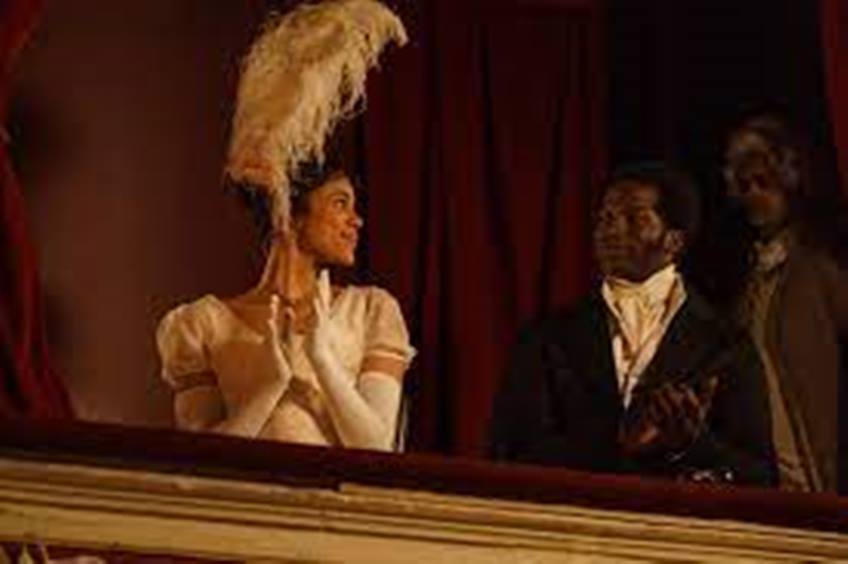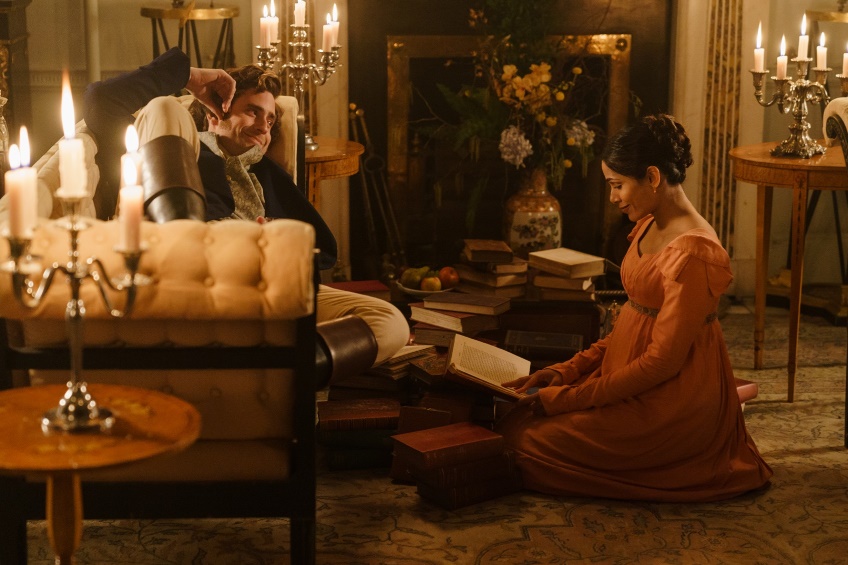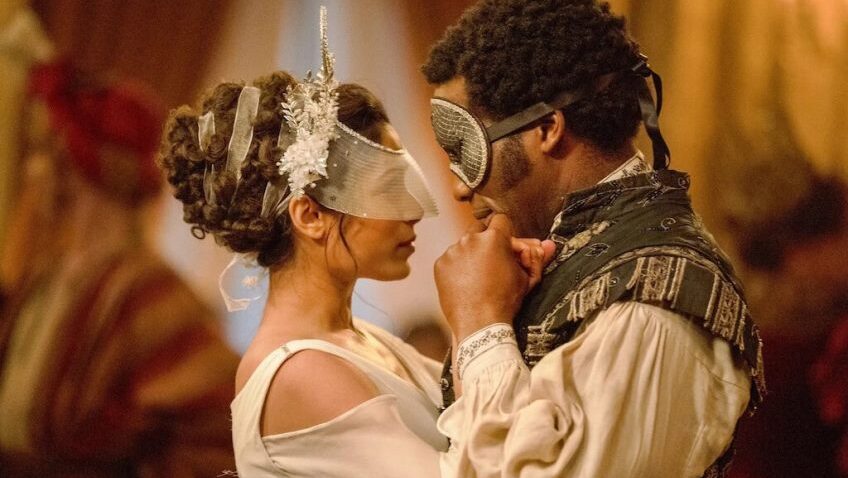Joyce Glasser reviews Mr. Malcolm’s List (August 26, 2022) Cert PG, 118 mins.
Jane Austen adaptations have proven so successful on television and in the cinema, that audiences have reached saturation point. Producers and writers have to come up with alternative ways to deliver frothy, fun and mildly satirical Regency period comedies on screen. Whit Stillman did just that in his film Love and Friendship by ingeniously transforming the epistolary style of an unpublished Austen novella into the wittiest dialogue and funniest film of 2016. Now, Suzanne Allain has a go, adapting her original Regency comedy for director Emma Holly Jones to distinguish through innovative, if not altogether colour blind, casting.
In Mr. Malcolm’s List, Jones acknowledges the muted presence of Afro-Caribbean and people from the Indian subcontinent in British colonial society and decides to make them the aristocrats and educated as opposed to the servants. Don’t worry, we are put through all the societal pressures, misunderstandings and prejudices in the path to true love. But race is not the only factor in Mr Malcolm’s List, a film that uses class and the delicate quest for advantageous marriages like any Austin novel.
After a brief prologue, we are in high society London, 1818. Tall, attractive, stylishly dress, Julia Thistlewaite’s (Zawe Ashton) fourth season is passing and she’s still single. Mrs Finch’s Ladies Academy prepared her for one thing and her fortune was supposed to do the rest. But under her polished veneer Julia is not exactly the demure, obedient, subservient wife figure.

Her future depends on a date with the most eligible bachelor in London, Mr Malcolm (Sope Dirisu) a nouveau riche who lives with his wise mother in a palatial stately home. When Mr Malcolm invites Julia to the opera, she assumes he wants to show her off, as the opera is the place to see and to be seen – not to discuss music (Julia asks if Rossini is “the short one” on stage – or the Corn Laws (“I rather like them”).
Halfway through the date Julia has the impression that Mr Malcolm is not so much out to entertain and woo her as to quiz her. It will be Julia’s affable, gay cousin, Lord Cassidy (Oliver Jackson-Cohen), frequenting the same posh men’s clubs as Mr Malcolm, who will reveal that she was being measured up to a list and found wanting. Mr Malcolm was heard complaining that he tried to engage her in conversation but, “she thought the corn laws were a dietary regime.”
Mr Malcolm is looking for qualities such as: “Candid, truthful and guileless, amiable and even tempered.” Not surprisingly, he wants after dinner music and, a bit more unusual, the ability to talk about politics are also on the list. Whether this list is an attempt to prevent a rash marriage to a gold digger or the manifestation of a methodical mind, we do not know. But it could also be a subconscious defence to hide his insecurity – Mr Malcolm is black – and ensure the world approves of his choice. That the latter possibility even comes to mind suggests the film has something to say about the challenges of overcoming systemic racial prejudice and stereotypes.
Humiliated at having been rejected and furious when word gets out that Mr Malcolm dumped her, Julia vows revenge, and concocts a plan to give Mr Malcolm a taste of his own medicine.
She remembers her lower class roommate from Lady Finch’s Academy, Selina Dalton (Frieda Pinto), a working class girl from a large family who has just rejected a much older, wealthy suitor. Julia invites the surprised and intrigued young woman – ten years late – to London, where she gradually reveals her plan to trap the ghastly Mr Malcolm.
With the help of Lord Cassidy, Selina will be presented in society as a book reading, Chopin playing (Lord Cassidy provides the hands in one funny scene), saintly angel who has a word to say on all the political issues of the day. Once Julia and Lord Cassidy turn Selina into Mr Malcolm’s perfect woman, she will dump him.

There’s no spoiler in saying that the plan backfires. It is love at first sight for both, and hearing her eloquently put, informed attack on the Corn Laws at a dinner party seals the deal. When Selina tells Julia she is mistaken in her negative view of Mr Malcolm, Julia goes on the warpath against both of them.
What elevates Mr Malcolm’s List from a variation on Jane Austen to something more thought-provoking and interesting is the introduction of a character with more depth and perception than any of the others. He will transform our view of the characters and our perceptive on the story. That character is Captain Henry Ossory (brilliantly underplayed by Theo James), who quickly determines that despite her silly revenge antics, Julia is much more interesting, fun, subversive and perhaps more intelligent than anyone gives her credit for.
When Mr Malcolm and Selina are out walking, they come across Captain Henry Ossory, a well-dressed, handsome soldier with a moustache and a twinkle in his eye. He unwittingly advances Julia’s plan by making Mr Malcolm jealous over his prior relationship with Selina, but also by telling him how they met. Julia served as a loyal companion to his elderly aunt, allowing Mr Malcom to tick off “kind and altruistic.”
As Captain Ossory stands aside for Mr Malcolm, he finds himself paired off with Julia (in another mixed race pairing) and begins to see her in a new light. So do we. We begin to tire of Selina’s real, if not feigned, perfection and of Mr Malcolm’s impossible standards and realise that Julia’s gripes about Mr Malcolm are more than sour grapes. Is his list not the ultimate of male chauvinism, snobbery and double standards?
When at a pheasant shoot, Julia jumps out of her chair and fires away without missing a shot, it is the charming and fair-minded Captain Ossory’s turn to fall in love. He does so with his eyes wide open to Julia’s overlooked talents and childish tantrums. Perhaps the tantrums, like the list, are a product of societal pressures and upbringing and not true nature.




